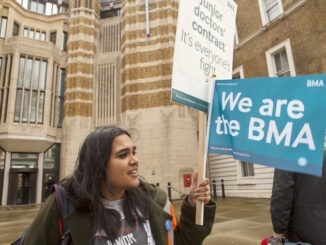
New data from The Food Foundation shows huge numbers of essential workers in the UK are struggling to access enough food
A quarter (24.9%) of households in which NHS or social care workers live experienced food insecurity in January 2023, as did more than a quarter (25.8%) of households home to food sector workers and more than a fifth (21.1%) of households home to education workers.
These figures come in the midst of the NHS and education unions dispute with government calling for wage increases to keep up with rising prices and as frontline workers delivering essential services continue to struggle with the cost of living crisis.
Of all households that were food insecure in January 2023, 38.6% are in employment, indicating that being in work is not necessarily sufficient to prevent families from falling into food insecurity.
Food insecurity is also extremely prevalent amongst households in receipt of benefits, many of who are also in work: nearly half (49.0%) of households receiving Universal Credit experienced food insecurity at the beginning of the year.
Latest data on national food insecurity levels from The Food Foundation’s Food Insecurity Tracker show 9.3m adults (17.7% of households) experienced food insecurity in January 2023, with one in four households with children (4m children) experiencing food insecurity in same month.
These findings demonstrate that food insecurity continues to be highly prevalent in the UK and that for many, wages and benefits are simply not providing enough to live on.
The Food Foundation is calling on the government to take action to ensure no one in the UK has to suffer food insecurity by ensuring that minimum wage and benefit levels are set at values that take into account what is required for families to afford a healthy diet.
Anna Taylor, executive director of The Food Foundation, said: “Struggling to afford food is by no means confined to those out of work. Many people doing important jobs are also suffering the stress and indignity of not knowing if their pay cheque will allow them to buy the bare essentials. Businesses must pull out all the stops to help their lower paid staff and the government needs to seriously scrutinise why their policies are failing to protect struggling families from affording the basics and start setting some targets for reducing food insecurity levels, particularly amongst benefit claimants. ”
Donna Barton, Usdaw representative and convenience store worker, said: “The cost of living is absolutely eye-watering. Everyone is cutting corners, cutting back and doing without; trying to make cheaper meals, which means healthy eating has gone out of the window. Ketchup is £4 a bottle, who can afford that? I can’t believe a pint of milk is now 95p, it used to be £1.10 for four pints…. I live on my own, which means I’m responsible for all the bills and I dare not put the heating on unless I absolutely have to. We’ve had pay rises this year that are above the headline rate of inflation, I don’t know how I’d have kept my head above water without those, but all that increase has been swallowed up by rising prices, particularly for food and energy bills which have gone up so much more. The company also gives us free food at break time and bigger discounts on pay day, which all helps, but it’s still really tough to make ends meet.”
Niamh Sweeney, deputy general secretary, National Education Union (NEU), said, “Pay is a serious issue across the education sector. It is one of the reasons why teachers and support staff are leaving the profession and why many decide not to enter it. The government missed its target for recruiting new secondary school teachers by 41% this year.
“Support staff and special needs support assistants are leaving for jobs with higher pay, less hours and less stress. Some of our most vulnerable pupils are losing out.
“We need fair pay to recruit more to the profession and for the sake of children and young people’s education.”
Paddy Lillis, Usdaw general secretary, said: “The Food Foundation’s finding that a quarter of key workers in the food industry are experiencing food insecurity is appalling. It reflects an Usdaw survey of our own members working in food retail, distribution and manufacturing; which found that one in four are missing meals every month to be able to pay their bills. The ongoing cost of living crisis is a key challenge for the Government, with skyrocketing prices leaving too many workers struggling to make ends meet. Food and drink inflation is much higher than the overall rate of inflation, with many staple items like milk, eggs, bread and potatoes rising at twice the headline rate. That clearly demonstrates the scale of the challenge for workers struggling to make ends meet. We need Government action to tackle rising bills, along with a new deal for workers to end low-paid and insecure employment, along with a social security system that gives people a proper safety net.
Rachel Harrison, GMB national secretary, said: “No one should face food insecurity in one of the richest countries on earth. And it is a disgrace that so many of our social care, NHS, and school support staff workers aren’t even earning enough to cover these essentials.
“NHS workers had to take strike action for better wages, and pay rates are desperately low across care and school support staff roles. Too many of these workers – who do vital work for the most vulnerable and our children – are paid a pittance.
“And it is a mark of shame that half of NHS Trusts are setting up foodbanks for their own workers. This shows why decent pay rises for NHS workers are essential.
“It’s time that the government and employers paid the decent wages that all key workers deserve.”



Be the first to comment